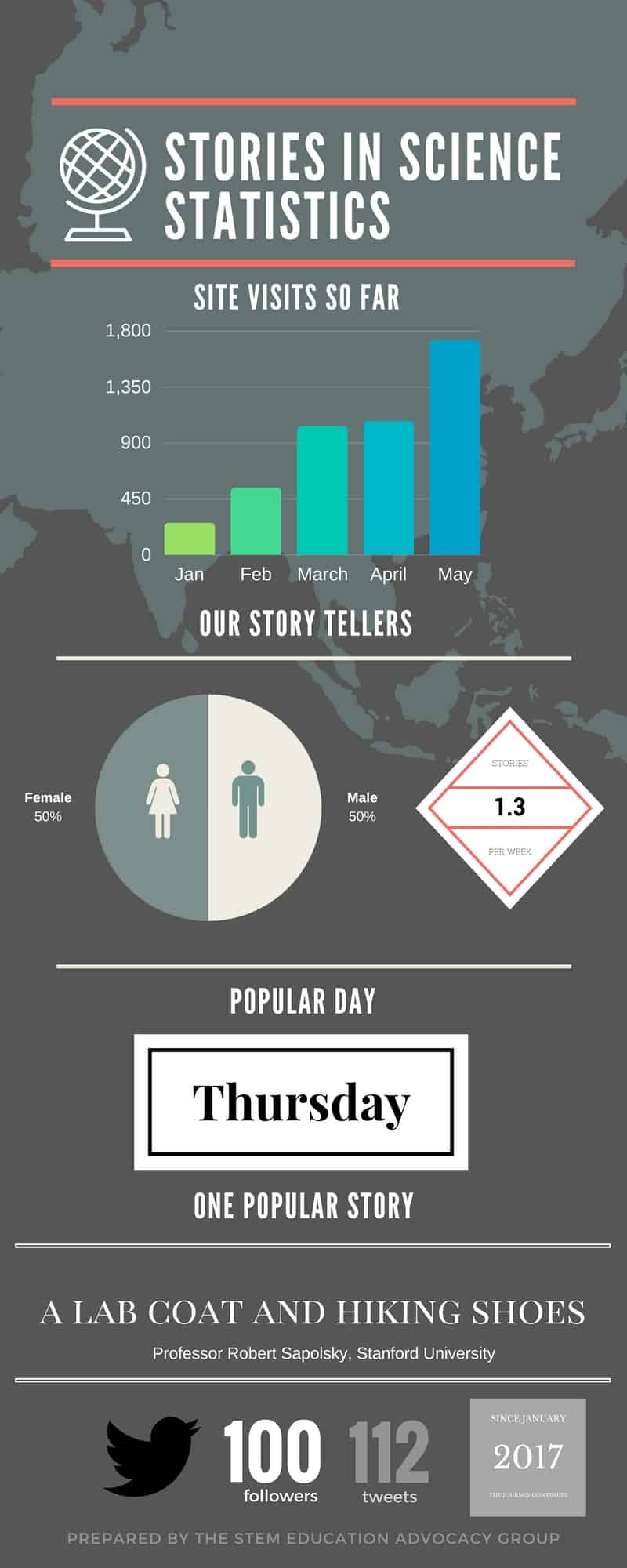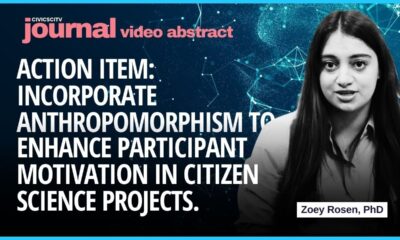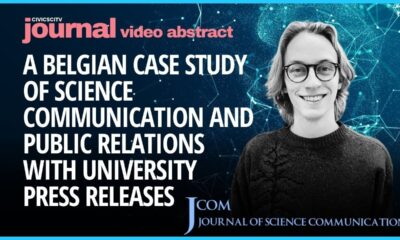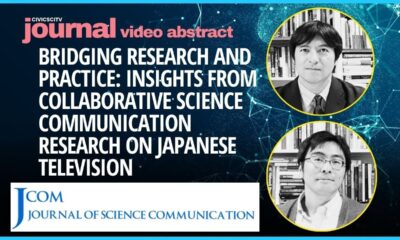Civic Science Observer
Stories_insci: An Interview with Elsevier
Below is an interview by Mary Preap (Associate Acquisitions Editor from Elsevier about our Stories in Science Initiative.
Originally published on SciTech Connect Elsevier on May 11 2017 –
[dropcap]S[/dropcap]tories in Science is an online platform where people can share stories about their relationship with science and read stories that have been shared by others. As noted on the website, “We are surrounded by so many stories in science. Stories of success, failure, fear, discovery, serendipity, collaboration, separation, inspiration, mentorship, and so much more.” One of the aims of the site is to inspire and to connect with those involved in science as well as those interested in science. Reading through the stories, there seem to be some common themes around challenges, determination, support, and surprising turns.
Stories in Science is led by the STEM Education Advocacy Group which is based in Boston. The group is driven by the idea that equitable access to quality science education is achievable around the world. Their work is currently focused on analyzing, advising, and advocating for science education initiatives and organizations around the world. I reached out to two of the co-directors, Fanuel Muindi, PhD and Jessica Tsai, MD-PhD, with some questions. Below is a transcript of our Q&A.
Mary Preap: Why do you think it’s important to share these kinds of stories?
Jessica Tsai: We rarely hear these stories, but everyone has them. I think it’s important to share these stories because they bring people together. We’ve all had frustrations, mistakes, and failures, but it’s easy to think you are alone in your struggles. These kinds of stories are especially important for young people. Getting involved in science or engineering can seem daunting to someone who has never done it before. I also think these stories have value for more seasoned scientists. Fanuel and I like to call these our “origin stories.” They remind us of that initial spark that attracted us to science. It’s so important to ground yourself and remember those moments on your journey where you thought, “Wow. Science is just so cool.”
Fanuel Muindi: Jessica really stated it nicely that, at the core, these stories bring people together. I think there is a fabric, if you will, that we are slowly unraveling as we continue to collect more and more stories. It’s important to reveal the temporal and spatial structure of this beautiful fabric and show the many connections that exist between stories. Both Jessica and I truly believe that one story has the power to make a difference. All it takes is one story to inspire the next generation!
Mary Preap: There are a number of great stories that people shared. What is one of your favorites so far?
Jessica Tsai: They are all so great – it’s so tough to pick just one! But, if I had to choose I would say Robert Sapolsky’s story has been my favorite so far. I’m a bit partial because I took his course Human Behavioral Biology as an undergraduate at Stanford University. I just love the juxtaposition of the lab coat and hiking shoes. His story is easily accessible and beautifully reconciles his love of these two wonderful things as he describes his incredible path of pursuing both field work and traditional lab work. My favorite line in the story is at the end where he writes, “This is a wonderful way to spend your life.” Reading that story just makes me smile.
Fanuel Muindi: It has been an honor to read these stories. As you can imagine, some of these stories are rather personal as authors attempt to put us in their shoes. Each one is great in its own way. If I had to pick one so far, I would select Dr. Steve Ramirez’s story titled “From engrams to psychiatric disorder and back.” Steve is a neuroscientist and he does a nice job taking us through the moments and conversations when things began to fall into place in his thinking. I particularly like then he wrote the following: “I was never a 4.0 GPA person and according to my GRE scores, I can barely speak English or do long division. But that’s why research made sense to me: these numbers don’t matter in a world of asking questions, testing hypotheses, and observing brains in action.” This is a powerful statement coming from a rising superstar in neuroscience research. I highly recommend people read his story.
Mary Preap: Is there anything in regards to people’s reactions or submissions that has surprised you?
Jessica Tsai: I’m still surprised at how much these stories really resonate with people. Everyone has vastly different experiences and backgrounds, yet there are critical elements of every story that seem to be universal. These elements – wonder, excitement, curiosity, struggle, perseverance – are not unique to science. Science just happens to bring them out. I’m not a meteorologist nor have I ever had a moving office on a research vessel traveling across the Atlantic Ocean! Yet, somehow, I feel a sense of camaraderie reading Stephanie Fiedler’s story. I understand what she means when she says, “The wobbly journey is a good reminder to maintain a flexible mind.” So, what I’m trying to say, in a very roundabout way, is that I’m really surprised by the meaningful connections these stories bring to people who have never met each other. That is truly amazing to me.
Fanuel Muindi: I have been so moved by how supportive people have been towards this project. I think it is amazing that many people see the potential of this project and most are willing to write a story. It is wonderful to work with authors as they write their stories. I am very excited about the future!
Statistics from May 2017
Useful Reading
(A) Blackwell, L.,Trzesniewski, K., & Dweck, C. S. Implicit theories of intelligence predict achievement across an adolescent transition: A longitudinal study and intervention. Child Development, (2007) 78, 246-263. DOI: 10.1111/j.1467-8624.2007.00995.x
(B) Lin-Siegler, X., Ahn, J. N., Chen, J., Fang, F.-F. A. & Luna-Lucero, M. Even Einstein struggled: Effects of learning about great scientists’ struggles on high school students’ motivation to learn science. J. Educ. Psychol. (2016). doi:10.1037/edu0000092 PDF
The CS Media Lab is a Boston-anchored civic science news collective with local, national and global coverage on TV, digital print, and radio through CivicSciTV, CivicSciTimes, and CivicSciRadio. Programs include Questions of the Day, Changemakers, QuickTake, Consider This Next, Stories in Science, Sai Resident Collective and more.

-
 Audio Studio1 month ago
Audio Studio1 month ago“Reading it opened up a whole new world.” Kim Steele on building her company ‘Documentaries Don’t Work’
-
Civic Science Observer1 week ago
‘Science policy’ Google searches spiked in 2025. What does that mean?
-
Civic Science Observer1 month ago
Our developing civic science photojournalism experiment: Photos from 2025
-
Civic Science Observer1 month ago
Together again: Day 1 of the 2025 ASTC conference in black and white
Contact
Menu
Designed with WordPress

























